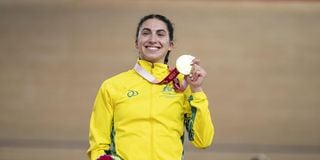Australia's Greco grabs first gold at Tokyo Paralympics

Gold medallist Australia's Paige Greco poses with her medal on the podium after the women's C1 3000m individual pursuit event during the Tokyo 2020 Paralympic Games at Izu Velodrome in Izu on August 25, 2021.
What you need to know:
- Olympic and Paralympic organisers have insisted there is no evidence of infection spreading from Games participants to the Japanese public.
- All those involved in the Games have to abide by virus countermeasures including regular testing and some limits on movement.
- But some experts have warned that holding the Games has undermined the government's messaging on the virus, encouraging people to go out and mingle.
Tokyo
Australian cyclist Paige Greco scooped the first gold medal of the Tokyo Paralympics on Wednesday, as the sport got under way a day after a high-energy but poignant opening ceremony.
Despite a year-long postponement and with the shadow of Covid-19 hanging over the event, records began falling almost immediately in both cycling and swimming as the competition heated up.
Greco took gold in record-breaking fashion in track cycling's C1-C3 class 3,000 metre individual pursuit, beating China's Wang Xiaomei.
The Australian had smashed her own world record by nearly eight seconds to qualify fastest from the morning heats.
She then lowered that time by another second and a half to 3min 50.815sec in the final just over two hours later.
Silver medallist Wang -- who had also beaten Greco's old world record in the heats -- had no answer to the Australian's power, finishing more than four seconds adrift.
In the wheelchair rugby pool stage, defending gold medallists Australia suffered a shock setback in their bid to become the first team to top the podium at three consecutive Games, losing 54-53 to Denmark.
Meanwhile, British swimmer Reece Dunn set a new Paralympic record in the men's 100m butterfly S14 category.
The Games were declared open on Tuesday night by Japan's Emperor Naruhito, with International Paralympic Committee chief Andrew Parsons paying tribute to the grit of the athletes who made it to Tokyo.
"Many doubted this day would happen, many thought it impossible, but thanks to the efforts of many, the most transformative sports event on Earth is about to begin," he said.
The ceremony was themed around the story of a one-winged plane trying to fly, and featured high-octane musical and acrobatic sequences in a departure from the more sombre Olympics opening ceremony.
Notably missing from proceedings was Afghanistan's team, who had been trapped in the country after the Taliban takeover.
The IPC confirmed Wednesday that the team, composed of two athletes, was now out of Afghanistan, but declined to say where they had gone.
Covid worries
Despite the triumphant atmosphere after a year-long pandemic postponement, the spectre of coronavirus will hang over proceedings.
The opening ceremony took place before a largely empty stadium with almost all spectators barred from venues because of coronavirus rules.
Still, for athletes who have spent years preparing, the competition will be all that matters -- with 24 gold medals being contested on the first day in cycling track, wheelchair fencing and swimming.
Stars appearing Wednesday include Brazilian swimmer Daniel Dias, who is competing at his last Paralympics and has the chance to become the most decorated male Paralympic swimmer of all time.
Organisers on Wednesday reported 16 new Covid-19 cases linked to the Paralympics, including two athletes in the Paralympic Village, whose identities have not been disclosed.
The new cases bring the number of infections linked to the Paralympics to 176, most of them Japan-based staff or contractors.
The Games kicked off during a record surge in infections, with 13 Japanese regions including the capital under a virus state of emergency.
The measure, which largely limits bars and restaurants from selling alcohol and shortens their opening hours, is to be expanded to a further eight regions as the government attempts to check the spread of the highly contagious Delta variant.
Japan has recorded around 15,500 deaths from the virus, and 40 percent of the population is now fully vaccinated.
Olympic and Paralympic organisers have insisted there is no evidence of infection spreading from Games participants to the Japanese public.
All those involved in the Games have to abide by virus countermeasures including regular testing and some limits on movement.
But some experts have warned that holding the Games has undermined the government's messaging on the virus, encouraging people to go out and mingle.





